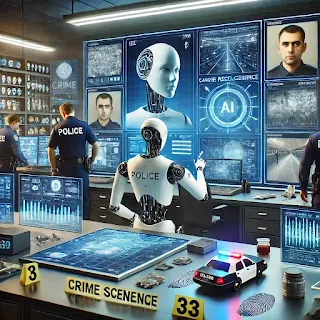Artificial Intelligence (AI) is no longer just a buzzword. It's quietly transforming many industries—and one of the most intriguing is crime solving. But can AI really solve crimes? The short answer: Yes, to some extent. Let’s explore how AI is being used in law enforcement, real-world cases, and what the future might look like.
 |
| Police Officers Collaborate with Artificial Intelligence in a High-Tech Crime Lab to Solve Cases Using Facial Recognition and Digital Evidence. |
How AI Helps in Solving Crimes
-
Predictive Policing
AI analyzes historical crime data to predict where crimes are likely to occur. This helps law enforcement deploy resources more effectively.
Example: The Los Angeles Police Department (LAPD) used a tool called PredPol, which showed some success in reducing property crimes.
Source: RAND Corporation -
Facial Recognition
AI-powered facial recognition can match suspects from surveillance footage or social media.
Example: In 2018, New Delhi Police identified over 3,000 missing children in just four days using facial recognition tech.
Source: BBC News -
Crime Pattern Detection
AI systems can detect fraud, cybercrimes, and even financial scams by identifying unusual patterns in data.
Example: AI helped HSBC monitor and detect fraud in financial transactions by analyzing billions of records.
Source: Forbes -
Digital Evidence Analysis
AI can analyze audio, video, and text faster than human investigators. It can transcribe calls, scan thousands of emails, and pick out relevant evidence.
Real Case: AI Helped Catch a Serial Killer
In Toronto, Canada, AI helped police connect the dots between multiple disappearances in the LGBTQ+ community. By analyzing location and social media data, AI led to the arrest of Bruce McArthur, a serial killer.
Source: The Guardian
The Challenges of Using AI in Crime Solving
- Privacy Concerns: AI surveillance can feel invasive. Facial recognition, in particular, raises ethical concerns.
- Bias in Data: AI is only as good as the data it's trained on. If the data is biased, the results will be too.
- False Positives: AI can wrongly identify suspects, leading to legal issues.
Future of AI in Crime Solving
AI won’t replace police officers, detectives, or judges—but it will support them. From real-time crime detection to automated investigations, AI is becoming a powerful assistant in the justice system.
Conclusion
So, can AI solve crime? Yes—but not alone. It’s a tool, not a miracle. When used responsibly, AI can speed up investigations, prevent crimes, and even save lives.
💬 What do you think?
Can AI truly become a game-changer in crime solving? Share your thoughts in the comments below! 👇
🔗 Also read: The Dark Side of AI: Addressing Ethical Concerns — Learn about the risks and ethical dilemmas AI brings to our lives.
Comments
Post a Comment